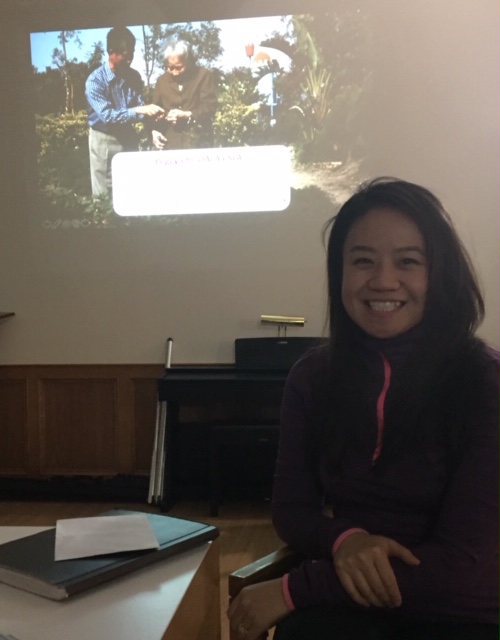 The speaker at our January meeting was Peggy Chi. Peggy Chi is a landscape architect, dementia care mapper, and a PhD candidate in health services research at the Institute of Health Policy, Management, and Evaluation based at the University of Toronto. Her presentation focused on the connection between health outcomes and nature in healthcare contexts.
The speaker at our January meeting was Peggy Chi. Peggy Chi is a landscape architect, dementia care mapper, and a PhD candidate in health services research at the Institute of Health Policy, Management, and Evaluation based at the University of Toronto. Her presentation focused on the connection between health outcomes and nature in healthcare contexts.
Her doctoral research examines the influence of the natural environment (e.g., exposures to daylight, access to the outdoors, and connections to nature) on residents’ mental health and well-being and frontline staff’s job stress in long-term care. Peggy has 17 years of academic training and professional experiences in the fields of architecture and landscape architecture. She has worked on design projects of urban parks, city master plans, transportation infrastructures, commercial buildings and residential buildings located in Canada, the UK, Italy, and Saudi Arabia. More recently, she helped Long Term Care (LTC) homes develop evidence-based design visions and program interventions to optimize the use of outdoor environments in LTC care delivery.
Peggy discussed her doctoral research. Her discussion included the advantages of daylight exposure especially exposure to outside spaces and to living plants both indoors and outdoors and how they contribute to the physical and mental health of both residents and health care workers.
Recent evidence indicates that Daylight exposure does the following related to physial health:
-increases Vitaminn D and improves sleep
-reduces analgesic intake
-clears actinic keratosis lesions
Exposure to Living Plants contributes to improved physical health in the following ways:
-reduces heart rate
-increases sensory stimulation
-increases physical activeness and total energy intake
-reduces blood pressure, pulse ratings and fatigue
Daylight exposure contributes to mental health in the following ways:
-increases emotional expressions of pleasure, alertness and quality of life
-reduces psyhchiatric hospitalization, delirium, anxiety and agitation
Living Plants contribute to mental health in that it:
-improves quality of life and wellbeing
-decreases feelings of existential distress
For Health Care Workers, exposure to Daylight and Live Plants:
-decreases blood pressure, sleepy behavious, job stress and deteriorated mood
-increases job satisfaction
Peggy went on to explain the process used to introduce changes to health care environments in order to include more access to the outside environment and to living plants.
–
